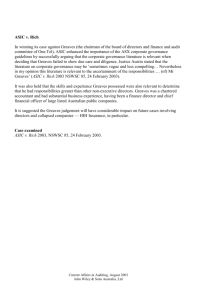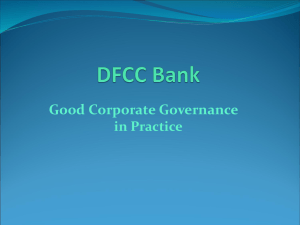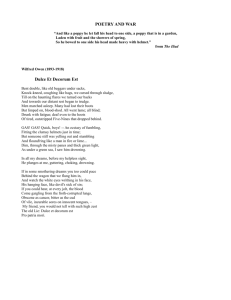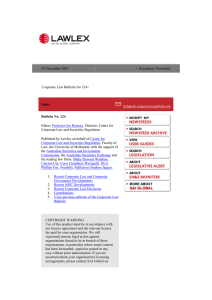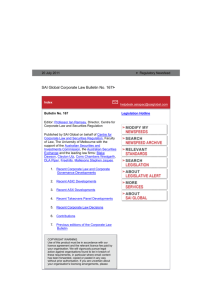ASIC v Rich In the last edition of Current Affairs in Auditing it was
advertisement
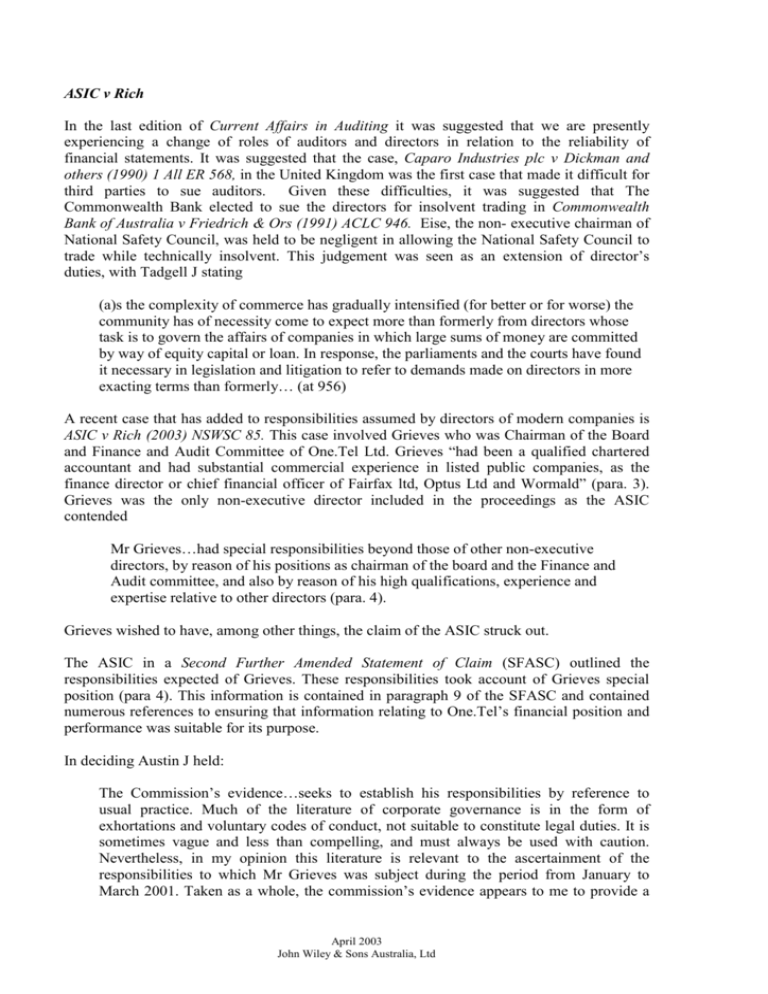
ASIC v Rich In the last edition of Current Affairs in Auditing it was suggested that we are presently experiencing a change of roles of auditors and directors in relation to the reliability of financial statements. It was suggested that the case, Caparo Industries plc v Dickman and others (1990) 1 All ER 568, in the United Kingdom was the first case that made it difficult for third parties to sue auditors. Given these difficulties, it was suggested that The Commonwealth Bank elected to sue the directors for insolvent trading in Commonwealth Bank of Australia v Friedrich & Ors (1991) ACLC 946. Eise, the non- executive chairman of National Safety Council, was held to be negligent in allowing the National Safety Council to trade while technically insolvent. This judgement was seen as an extension of director’s duties, with Tadgell J stating (a)s the complexity of commerce has gradually intensified (for better or for worse) the community has of necessity come to expect more than formerly from directors whose task is to govern the affairs of companies in which large sums of money are committed by way of equity capital or loan. In response, the parliaments and the courts have found it necessary in legislation and litigation to refer to demands made on directors in more exacting terms than formerly… (at 956) A recent case that has added to responsibilities assumed by directors of modern companies is ASIC v Rich (2003) NSWSC 85. This case involved Grieves who was Chairman of the Board and Finance and Audit Committee of One.Tel Ltd. Grieves “had been a qualified chartered accountant and had substantial commercial experience in listed public companies, as the finance director or chief financial officer of Fairfax ltd, Optus Ltd and Wormald” (para. 3). Grieves was the only non-executive director included in the proceedings as the ASIC contended Mr Grieves…had special responsibilities beyond those of other non-executive directors, by reason of his positions as chairman of the board and the Finance and Audit committee, and also by reason of his high qualifications, experience and expertise relative to other directors (para. 4). Grieves wished to have, among other things, the claim of the ASIC struck out. The ASIC in a Second Further Amended Statement of Claim (SFASC) outlined the responsibilities expected of Grieves. These responsibilities took account of Grieves special position (para 4). This information is contained in paragraph 9 of the SFASC and contained numerous references to ensuring that information relating to One.Tel’s financial position and performance was suitable for its purpose. In deciding Austin J held: The Commission’s evidence…seeks to establish his responsibilities by reference to usual practice. Much of the literature of corporate governance is in the form of exhortations and voluntary codes of conduct, not suitable to constitute legal duties. It is sometimes vague and less than compelling, and must always be used with caution. Nevertheless, in my opinion this literature is relevant to the ascertainment of the responsibilities to which Mr Grieves was subject during the period from January to March 2001. Taken as a whole, the commission’s evidence appears to me to provide a April 2003 John Wiley & Sons Australia, Ltd reasonably arguable case for the view that Mr Grieves had the responsibilities pleaded in paragraph 9 of the SFASC (para. 70). The courts are heeding the debate and writings relating to corporate governance and respect society’s wishes to have directors more fully accountable for data relating to financial position and performance. In this case, directors who have expertise and experience and held positions of responsibility such as chairman of the Board and Finance and Audit committee has considerable responsibilities relating to data pertaining to financial position and performance. References ASIC v Rich (2003) NSWSC 85 Caparo Industries plc v Dickman and others (1990) 1 All ER 568 Commonwealth Bank of Australia v Friedrich & Ors (1991) ACLC 946 April 2003 John Wiley & Sons Australia, Ltd






